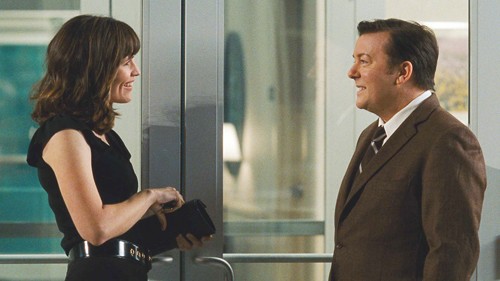Cinema has a way of introducing the American masses to some of life’s most ponderous, nuanced questions. What would you do if you were suddenly incapable of lying? What if you could internalize every woman’s most intimate thoughts? How about if Morgan Freeman allowed you all the powers of a god?
“”The Invention of Lying,”” the new magical realist comedy from the beloved, bumbling Britishman Ricky Gervais, uses a similar question as its platform: what would you do if you were the only person alive capable of lying? It is thus with blockbuster bravado and a scrutinizing eye for the moral fragility of mankind that Gervais’ brainchild embarks on a touching, provocative laugh-riot of a journey to the center of the human psyche that can only be described as the next great catalyst to reshape Western philosophy and shatter all that we believe in.
Okay, that’s a lie.
“”The Invention of Lying”” follows the formula of any family-friendly romantic comedy complicated by a bit of unexplainable magic, a la “”Liar Liar”” (1997), “”What Women Want”” (2000) and “”Bruce Almighty”” (2003), and is just as predictable. Gervais, who co-wrote and directed the film, plays Mark Bellison, your typical out-of-luck schmuck (a screen-writer who specializes in the 13th century) whose existence is marred by an unfulfilling professional, social and sex life.
The twist? He is the only man exempt from the truth in a parallel version of human history where nobody is capable of lying or fabricating — a world where everyone simply says exactly what they’re thinking all the time and the best-selling movies consist of well-known “”readers”” reciting biographical facts from history.
This reality presents an immediate plot hole, positing a world where humans are incapable of producing fiction or imagining things that have not happened but are capable of inventing automobiles, movie theaters and every other modern convenience. But let’s forget that and focus on the film’s merits.
Here’s one: the cast. Perhaps the only saving grace of an otherwise mediocre film is the all-star list of players who appear in cameo roles throughout the film’s comic vignettes. Aside from Gervais and leading love interest Jennifer Garner (“”Juno,”” “”Alias””), cynical comedian Louis C.K. and portly character actor Jonah Hill (“”Superbad,”” “”Funny People””) fill out Bellison’s core of comrades as he exploits his newfound gift of deceit to move up the socioeconomic ladder.
Rob Lowe plays a smarmy rival screenwriter with Tina Fey as his equally douchebaggy cohort; Edward Norton is an overly-aggressive, overly-mustachioed traffic cop; John Hodgman is a minimalistic clergyman; and Philip
Seymour Hoffman, in perhaps the funniest scene in the entire film, is a laconic bartender with mammaries on the mind. Between these big names are infrequent spurts of hilarity, playing off of each actor’s reputation for full comedic effect in an otherwise dragging narrative.
Other than that, Gervais’ “”Invention”” has very little going for it. The shaky premise combines with a blatant critique of white-collar America and, eventually, a blunt denunciation of organized religion to leave the audience with a film that is more awkward than it is funny, more tactlessly critical than it is thought-provoking.
The PG-13 rating robs Gervais of the vulgar comic potential — both as a writer and actor — that defined his lauded role in the BBC “”Office,”” and that absence makes itself clear too often (specifically when a brutally honest bit character reveals “”I just took the biggest poop of my life!”” in an opening montage). With the aggregate talent of its constituents and the intriguing prospect of a world without lying, “”Invention”” had so much potential to be more than a drab family-fluff piece, but to say it exceeded that description would just be a lie.









